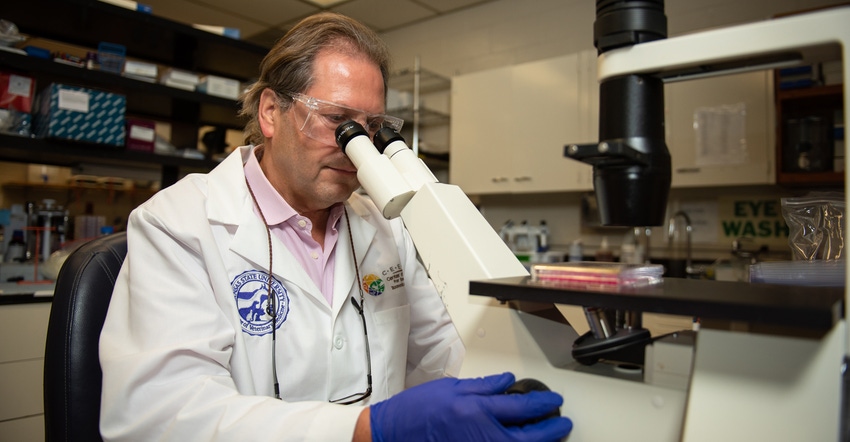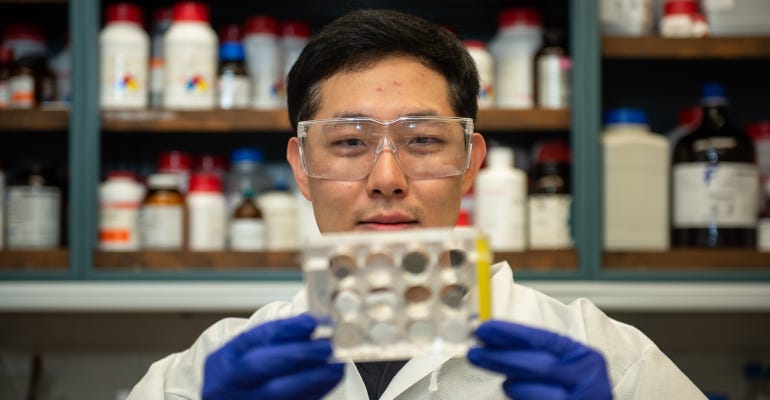
Kansas State University researchers have found that cats are highly susceptible to the human SARS-CoV-2 virus that causes COVID-19, but that pigs are not.
“We have not seen obvious clinical signs of illness in cats 5 to 7 months old, but older cats or cats with comorbidities might show clinical signs,” says Dr. Jürgen Richt, the Regents distinguished professor at the K-State College of Veterinary Medicine.
Richt said two studies from K-State researchers and collaborators have been recently published. One focused on cats and the other on pigs, examining whether or not those species were able to become infected by contact with humans. The research showed cats easily become infected and do spread the virus to other cats, but pigs do not appear to contract the virus.
He said both studies were undertaken because of the large amount of contact between humans and companion animals, such as cats; and because of the importance of livestock animals, such as pigs in the human food chain and the level of contact between human farmworkers and those animals.
“Other research has shown that COVID-19-infected human patients are transmitting SARS-CoV-2 to cats; this includes domestic cats and even large cats, such as lions and tigers,” Richt says.
 PART OF THE TEAM: Taeyong Kwon, a K-State University doctoral student in pathobiology, is part of a collaborative research team that is studying SARS-CoV-2 transmission.
PART OF THE TEAM: Taeyong Kwon, a K-State University doctoral student in pathobiology, is part of a collaborative research team that is studying SARS-CoV-2 transmission.

What the study did not show was whether those infected cats can, in turn, transmit the virus back to humans or to other species, and studies to try to answer that question will continue. The research so far does not point toward cats being a significant reservoir of the virus in the environment, but the concern is real.
“There are about 95 million house cats in the U.S. and about 60 million to 100 million feral cats,” Richt says. “I am very concerned about feral cats. Many of them are fed daily by human volunteers.”
Richt is the senior author on the two recent collaborative studies published in the journal Emerging Microbes & Infections: "SARS-CoV-2 infection, disease and transmission in domestic cats" and "Susceptibility of swine cells and domestic pigs to SARS-CoV-2."
Virus transmission between cats, other species not yet known
Through their in-depth study at the K-State Biosecurity Research Institute (BRI) at Pat Roberts Hall, the researchers studied susceptibility to infection, disease and transmission in domestic cats. They found that domestic cats may not have obvious clinical signs of SARS-CoV-2, but they still shed the virus through their nasal, oral and rectal cavities, and can spread it efficiently to other cats within two days. Further research is needed to study whether domestic cats can spread the virus to other animals and humans.
“This efficient transmission between domestic cats indicates a significant animal and public health need to investigate a potential human-cat-human transmission chain,” says Richt, who is also the director of the university’s Center of Excellence for Emerging and Zoonotic Animal Diseases (CEEZAD) and the Center on Emerging and Zoonotic Infectious Diseases (CEZID).
For the study involving pigs, the researchers found that SARS-CoV-2-inoculated pigs are not susceptible to SARS-CoV-2 infection and do not appear to transmit the virus to contact animals.
“Pigs play an important role in U.S. agriculture, which made it important to determine the potential SARS-CoV-2 susceptibility in pigs,” Richt says. “Our results show that pigs are unlikely to be significant carriers of SARS-CoV-2.”
BRI has provided the high-security laboratories for Richt and collaborators to study SARS-CoV-2. It is a biosafety level-3 and biosafety level-3 agriculture facility that houses important multidisciplinary research, training and educational programs on pathogens that affect animals, plants and insects, as well as food safety and security.
Richt and his collaborators plan further studies to understand SARS-CoV-2 transmission in cats and pigs. They also plan to study whether cats are immune to SARS-CoV-2 reinfection after they have recovered from a primary SARS-CoV-2 infection.
“This research is important for risk assessment, implementing mitigation strategies, addressing animal welfare issues, and to develop preclinical animal models for evaluating drug and vaccine candidates for COVID-19,” Richt says.
The research has involved other K-State researchers from the Department of Diagnostic Medicine/Pathobiology in the College of Veterinary Medicine: Natasha N. Gaudreault, Jessie D. Trujillo, David A. Meekins, Igor Morozov, Daniel W. Madden, Sabarish V. Indran, Dashzeveg Bold, Velmurugan Balaraman, Taeyong Kwon, Bianca L. Artiaga, Konner Cool, Wenjun Ma and Jamie Henningson. Henningson is also director of the Kansas State Veterinary Diagnostic Laboratory.
Other researchers involved include Mariano Carossino and Udeni B.R. Balasuriya from Louisiana State University; William C. Wilson with the USDA Arthropod-Borne Animal Disease Research Unit; Adolfo García-Sastre with the Icahn School of Medicine at Mount Sinai; and Heinz Feldmann with the National Institutes of Health’s National Institute of Allergy and Infectious Diseases.
This article includes information supplied in a Kansas State University News Service press release.
Read more about:
Covid 19About the Author(s)
You May Also Like






